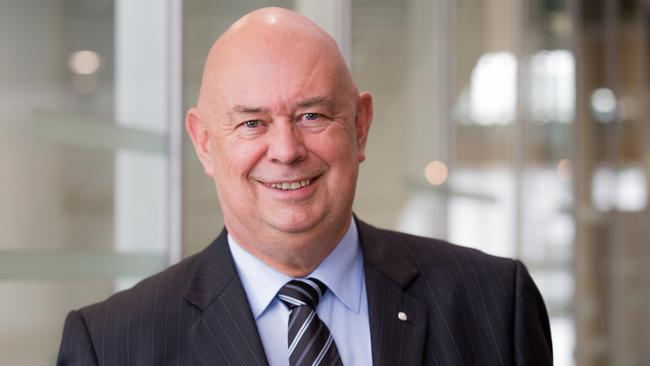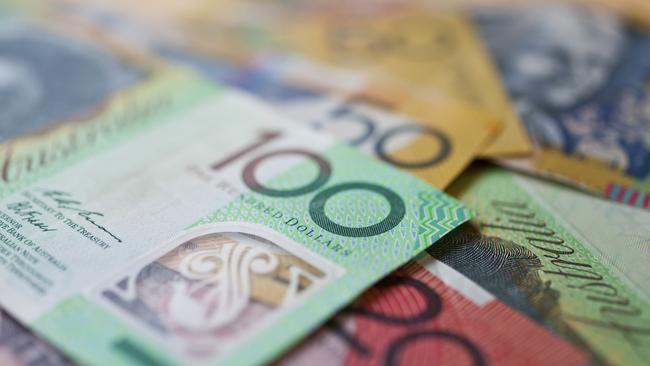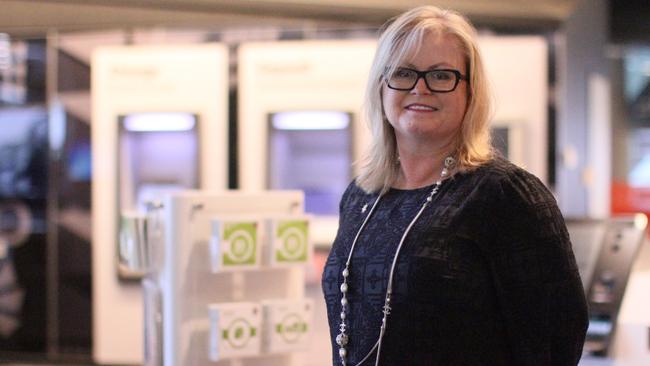Lockdown disaster payments surge past $4bn: how to get your share
The federal and state governments have turned on the money taps to help Australians survive lockdowns. See what you can claim.
National
Don't miss out on the headlines from National. Followed categories will be added to My News.
Disaster payments to Australians hit by Covid lockdowns have doubled in the past two weeks to $4.13 billion, new government figures reveal.
Payment data as of August 24 shows 1.72 million people have received at least one Covid disaster payment, which is tax-free and ranges between $450 and $750 a week.
More than 900,000 New South Wales residents have received $3 billion, while 372,000 Victorians have been paid $701 million.
In Queensland, 186,000 people have received $241 million, 86,000 South Australians received $48.1 million as a result of its one-week lockdown in July, and 40,000 people in the ACT have been paid $27.5 million.
Workers and business owners are being urged to grab government assistance payments as quickly as they can. The disaster payments to individuals were widened and increased in late July, while rules for business owners keep changing.
Services Australia General Manager Hank Jongen said 90 per cent of disaster payment claims from individuals were made online through myGov “which is the fastest and easiest way to claim” and payments were mostly made within a day or two.
“Eligible Australian residents should set up their myGov accounts so they can claim quickly and easily online,” he said. “There’s no need to call.”

However, business owners have been confused by a complex range of assistance and grants that vary dramatically between states and can depend on a business’s location, income and business type.
Here’s what individuals and business owners can get.
FOR INDIVIDUALS
COVID-19 Disaster Payment:
This is paid to people who lose hours because of a state government lockdown or public health order. It is accessed through my.gov.au and is paid weekly for as long as a hotspot declaration lasts, with claims opening one week after a lockdown begins.
People who lose 20 hours or more of work per week receive $750 per week and those who lose between eight and 20 hours – or a full day of work – are paid $450 per week. Payments are non-taxable, unlike JobKeeper that was paid as part of peoples’ wages.
www.servicesaustralia.gov.au/individuals/services/centrelink/covid-19-disaster-payment
Disaster payments for welfare recipients:
People who receive Centrelink income support such as the age pension, JobSeeker or Carer Payment and lose more than eight hours of work because of a public health order can receive a $200 weekly payment.
This payment is made even if you were only eligible for one day during a payment period, and can be applied for online through myGov accounts.
www.servicesaustralia.gov.au/individuals/services/centrelink/covid-19-disaster-payment
Pandemic Leave Disaster Payment:
This lump sum payment of $1500 is for people who were directed to self-isolate or quarantine by health authorities or were caring for someone with Covid-19.
The National Recovery and Resilience Agency says it is available across all states and territories, but you cannot receive this payment and the COVID-19 Disaster Payment at the same time. “To be eligible for the payment, you need to either be diagnosed with Covid-19, have been identified as a close contact of a person who has Covid-19, or caring for someone who has Covid-19,” it says.
The easiest way to claim for this is over the phone on 180 22 66, or 131 202 for languages other than English.
www.servicesaustralia.gov.au/individuals/services/centrelink/pandemic-leave-disaster-payment
Retiree help:
There are no cash payments to retirees like we saw in 2020, but the Covid-19 temporary reduction in minimum drawdown rates for seniors receiving a superannuation pension has been extended until June 2022.
This preserves retirees’ nest eggs and means, for example, someone aged between 65 and 74 only needs to withdraw 2.5 per cent a year from their account based pension, rather than the usual 5 per cent.
www.australiansuper.com/retirement/coronavirus-reduced-drawdowns
Banks’ assistance:
Australia’s banks helped more than a million customers last year with mortgage deferrals and other relief, and similar measures are now being offered but on a case-by-case basis.
NAB’s group executive of personal banking, Rachel Slade, said support could include temporary repayment breaks and fee waivers. “Financial difficulty can be managed,” she said. “It’s important that customers get in touch early, have a conversation and discuss their options. Lost income due to lockdown is not their fault.”
www.ausbanking.org.au/covid-19/

FOR BUSINESS OWNERS
While most payments to individuals are managed centrally through Services Australia, much of the financial assistance for businesses comes via state-based authorities.
Small Business Australia executive director Bill Lang said business owners should do an online search for “Covid-19 business assistance” to find programs that might help them, and speak with their accountant about assistance in their state.
“It’s very, very complicated … governments have consistently changed the definitions and payment timing is all over the place,” he said.
“People in lockdown six in Victoria are still waiting to receive money they were entitled to from lockdown four.
“You should apply for anything you can, and get your application early in the queue.”
Some government websites are yet to update details of latest announcements, but here’s a snapshot of business assistance in the four major lockdown states.
https://treasury.gov.au/coronavirus/businesses
New South Wales:
COVID-19 business grants are one-off support payments between $7500 and $15,000 where a business has annual turnover above $75,000 and suffered a revenue decline of 30 per cent of more.
JobSaver fortnightly payments are offering employing businesses 40 per cent of their weekly NSW payroll up to $100,000 a week, and $1000 per week to non-employing businesses such as sole traders, where revenue has declined at least 30 per cent. Eligible business entities include not-for-profits.
Micro business grants of $1500 per fortnight are paid to businesses with turnover between $30,000 and $75,000 and where no other government support is available. There are also payroll tax deferrals and reductions available for NSW businesses.
www.service.nsw.gov.au/campaign/covid-19-help-businesses/grants-loans-and-financial-assistance
Victoria:
The Business Costs Assistance Program offers automatic payments of thousands of dollars to businesses and sole traders depending on their industry sector. Eligible business sectors include non-essential retail, hospitality and tourism.
A Small Business Covid Hardship Fund is paying grants of $10,000 to eligible businesses that did not qualify for existing programs.
The Licensed Hospitality Venue Fund is offering payments between $5000 and $20,000, graded on venue capacity.
There’s an Alpine Business Support Program extension paying between $5000 and $20,000, and a Small Business Covid Hardship Fund allowing grants of up to $8,000 to be paid to small businesses that are not eligible for support under existing programs and have experienced a 70 per cent reduction in turnover.
www.coronavirus.vic.gov.au/business-grants-and-support
Queensland:
Small and medium businesses across the state that have been impacted by lockdowns may be eligible for $5000 grants if they have suffered at least a 30 per cent decline in turnover. The government says applications for these grants will open in mid-August and businesses require annual turnover above $75,000 and an annual payroll in Queensland of up to $10 million to be eligible.
Grants are also available to large hospitality an tourism businesses “subject to meeting eligibility criteria”.
There is a cleaning rebate paying up to 80 per cent of deep cleaning costs – up to $10,000 – for businesses declared an exposure site.
Tourism and hospitality businesses can defer paying payroll tax for six months, and a second round of the Marine Tourism Rebate has been announced after round one paid up to $20,000 per operator.
www.business.qld.gov.au/covid-assistance
South Australia:
Grants are available for SA businesses affected by the state’s July lockdown, and applications must be submitted by September 30.
These business support grants are for GST-registered businesses that had at least a 30 per cent revenue fall, and are worth $3000 for employing businesses and $1000 for non-employing businesses such as sole traders.
An additional CBD grant of $1000 was announced for city businesses, and there is a Major Events Support Grant of up to $25,000 for events that suffered significant financial loss because of lockdown-related cancellation or postponement.
www.treasury.sa.gov.au/Growing-South-Australia/COVID-19

Business banking:
NAB’s Ms Slade said business banking support included up to three-month loan repayment deferrals and refunds of merchant terminal fees for up to three months. Home loan support is available for business owners too. “Our business bankers are also checking in with customers,” she said.
www.ausbanking.org.au/covid-19/
Federal help:
Ongoing federal government programs providing assistance and tax relief. The SME Recovery Loan Scheme involves a government guarantee of 80 per cent of the loan amount, while Temporary Full Expensing allows businesses to claim an immediate tax deduction for all business assets and has been extended until July 2023.
https://treasury.gov.au/coronavirus/sme-recovery-loan-scheme
More Coverage
Originally published as Lockdown disaster payments surge past $4bn: how to get your share





